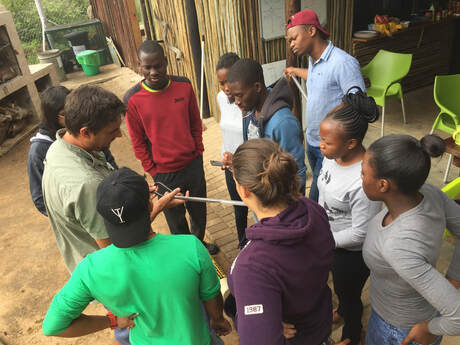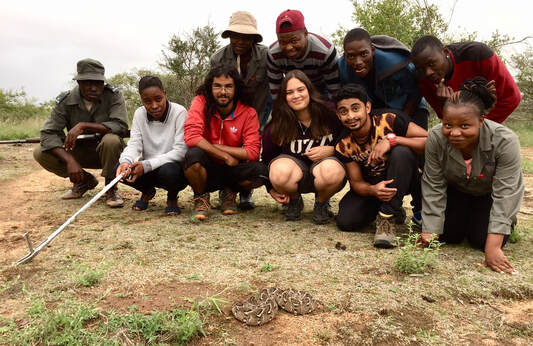2017 Winner: Dr. Bryan MaritZ
Project: The Reptile Diversity in African Savannas Field Course
Original announcement:
The Herpetological Conservation International board is proud to announce the first ever recipient of the Michael Dee Conservation Grant: Dr. Bryan Maritz. The grant was awarded to Dr. Maritz for his Reptile Diversity In African Savannas Field Course, a course which provides once in a lifetime conservation and herpetology training opportunities to economically disadvantaged college students from South Africa. The course will be led by Dr. Bryan Maritz and colleagues.
Michael Dee, and the entire HCI board, feel this project aligns strongly with HCI’s mission statement, as it will train and inspire the next generation of eager reptile and amphibian conservationists. Furthermore, the course’s inclusion of other megafauna, in particular rhinoceros, a group which Michael Dee was a key conservation contributor to during his career, makes this first grantee even more fitting.
About the Course:
The Reptile Diversity in African Savannas Field Course is a field course that allows South African university students from economically disadvantaged backgrounds to experience and conduct research on reptiles in world-famous Kruger National Park. The park hosts a remarkable diversity of reptiles and other fauna, but access and transport costs (the park is more than 1000 miles from Cape Town) means that Kruger remains entirely inaccessible to most South Africans. South Africa’s history and subsequent economic inequality means that many enthusiastic students, the future conservationists, never get to experience intact African savannas and their associated biodiversity. For many of these students, elephants, giraffes, crocodiles, and monitor lizards are completely foreign.
Dr. Bryan Maritz is a herpetologist from the University of the Western Cape—an institution that serves numerous disadvantaged communities in Cape Town. Having spent significant time in African savannas looking for reptiles and amphibians, Dr. Maritz recognises the power that wild landscapes and animals can have on young budding conservationists. Through this field course, Dr. Maritz hopes to give deserving herpetology students that exact experience.
The Reptile Diversity in African Savannas Field Course will be attended by students from the University of the Western Cape, the University of Venda, and the University of Mpumalanga. Students were selected based on their enthusiasm, and an application process that included an essay paper about reptile ecology and conservation. The two-week course will be led by a collaborative team from the University of the Western Cape, the University of the Witwatersrand, and the Skukuza Science Leadership Initiative. Students will attend lectures on reptile ecology and conservation, and importantly, learn field surveying techniques for reptiles and amphibians. Allowing them to actively participate in research projects as they gather information on the density and distribution of the more than 130 species of reptiles and amphibian that occur in the park— data critical for conservation and preservation of healthy reptile and amphibian communities as it is necessary for informing ecosystem management practices.
The Herpetological Conservation International board is proud to announce the first ever recipient of the Michael Dee Conservation Grant: Dr. Bryan Maritz. The grant was awarded to Dr. Maritz for his Reptile Diversity In African Savannas Field Course, a course which provides once in a lifetime conservation and herpetology training opportunities to economically disadvantaged college students from South Africa. The course will be led by Dr. Bryan Maritz and colleagues.
Michael Dee, and the entire HCI board, feel this project aligns strongly with HCI’s mission statement, as it will train and inspire the next generation of eager reptile and amphibian conservationists. Furthermore, the course’s inclusion of other megafauna, in particular rhinoceros, a group which Michael Dee was a key conservation contributor to during his career, makes this first grantee even more fitting.
About the Course:
The Reptile Diversity in African Savannas Field Course is a field course that allows South African university students from economically disadvantaged backgrounds to experience and conduct research on reptiles in world-famous Kruger National Park. The park hosts a remarkable diversity of reptiles and other fauna, but access and transport costs (the park is more than 1000 miles from Cape Town) means that Kruger remains entirely inaccessible to most South Africans. South Africa’s history and subsequent economic inequality means that many enthusiastic students, the future conservationists, never get to experience intact African savannas and their associated biodiversity. For many of these students, elephants, giraffes, crocodiles, and monitor lizards are completely foreign.
Dr. Bryan Maritz is a herpetologist from the University of the Western Cape—an institution that serves numerous disadvantaged communities in Cape Town. Having spent significant time in African savannas looking for reptiles and amphibians, Dr. Maritz recognises the power that wild landscapes and animals can have on young budding conservationists. Through this field course, Dr. Maritz hopes to give deserving herpetology students that exact experience.
The Reptile Diversity in African Savannas Field Course will be attended by students from the University of the Western Cape, the University of Venda, and the University of Mpumalanga. Students were selected based on their enthusiasm, and an application process that included an essay paper about reptile ecology and conservation. The two-week course will be led by a collaborative team from the University of the Western Cape, the University of the Witwatersrand, and the Skukuza Science Leadership Initiative. Students will attend lectures on reptile ecology and conservation, and importantly, learn field surveying techniques for reptiles and amphibians. Allowing them to actively participate in research projects as they gather information on the density and distribution of the more than 130 species of reptiles and amphibian that occur in the park— data critical for conservation and preservation of healthy reptile and amphibian communities as it is necessary for informing ecosystem management practices.




